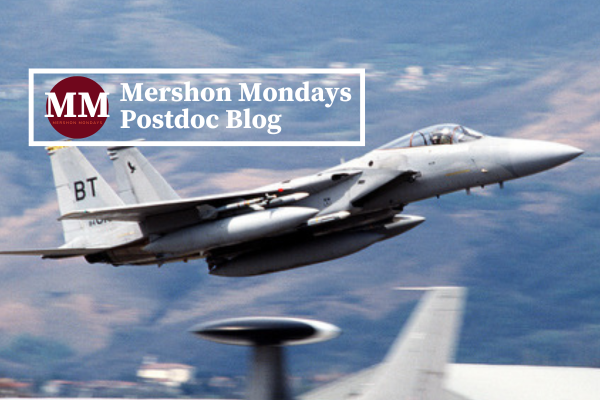Postdoc Blog: Stumbling to Victory

American Air Power, Diplomacy, and Politics in the Bosnian War
At our Mershon Monday event on October 14th, Chuck Laubach, a doctoral student specializing in military history at The Ohio State University and an officer with over 20 years of experience in the United States Air Force, presented his research on the Third Balkan War of the 1990s. Chuck’s project, titled Stumbling to Victory: American Air Power, Diplomacy, and Politics in the Bosnian War, unpacks how air power became a decisive yet complex tool in U.S. and NATO strategy during this tumultuous period. His research, supported by a Mershon grant, draws on extensive archival materials and contributes to a deeper understanding of post-Cold War humanitarian interventions and the use of military force in foreign policy.
Historical Context of Yugoslavia’s Fragmentation
Chuck began his presentation by providing historical context on the disintegration of Yugoslavia after the death of communist leader Josip Broz Tito in 1980. The absence of Tito’s unifying leadership and increasing economic hardship led to a surge in nationalist sentiments. By 1991, Slovenia and Croatia declared independence, triggering conflict as the Yugoslav People’s Army sought to maintain the federation. In 1992, Bosnia and Herzegovina’s declaration of independence resulted in a brutal civil war among Bosniaks, Serbs, and Croats, drawing international attention due to severe humanitarian crises, including allegations of ethnic cleansing.
Air Power as a Strategic Tool: NATO’s Response
Chuck traced the role that air power played during the Bosnian conflict and examined the implications of its use. Initially, the United States was hesitant to intervene directly in the war. Despite emerging as the world’s sole superpower after the Cold War, the U.S. preferred to emphasize multilateral efforts through the United Nations, aiming to balance public opinion that favored humanitarian aid but feared military casualties. However, as the conflict intensified—with UN-designated safe zones under siege and continued atrocities—the need for a more decisive response became apparent. The turning point came with the Srebrenica massacre in July 1995, where over 8,000 Bosniak men and boys were killed by Bosnian Serb forces. In response to international outrage and the evident failure of diplomatic efforts, NATO began contemplating air strikes.
In examining the political dimensions which precipitated the use of air power in August 1995, Chuck highlighted internal debates within the United States, with Senator Bob Dole (R-KS) and President Bill Clinton among the key players. Internationally, the election of leaders like French President Jacques Chirac in May 1995 proved critical. Chirac’s advocacy for decisive NATO action helped shift multilateral decision-making towards the use of air power. This shift culminated in NATO launching Operation Deliberate Force in August 1995, a two-week bombing campaign targeting Bosnian Serb military positions. This campaign was important in bringing the parties to the negotiating table, leading to the signing of the Dayton Accords in Dayton, Ohio, later that year.
Can Air Power Bring Peace?
A central question in Chuck’s research is: What role did air power play in compelling the Serbs to negotiate? While air power was crucial, Chuck explained that it was not sufficient on its own. Operation Deliberate Force showcased advancements in precision bombing but also revealed the challenges of executing air campaigns amidst environmental, political, and social complexities. The terrain of Bosnia, dispersed military targets, and the presence of civilian populations complicated the effectiveness of air strikes. In addition to the NATO air campaign, the successful ground offensives of Bosnian and Croatian government forces, coupled with a determined American-led diplomatic effort, played a critical role in achieving conditions to enable the subsequent peace negotiations.
By treating air power not just as a military asset but as a complex instrument intertwined with diplomacy and politics, Chuck’s work offers valuable insights into the challenges of using military force in ethically charged conflicts. His research reminds us of the importance of critically evaluating how military force can promote peaceful diplomatic solutions.
Mershon Monday Story by Postdoctoral Scholar Helen Murphey, in collaboration with colleagues Julia Marino and Nicholas Nyachega.
